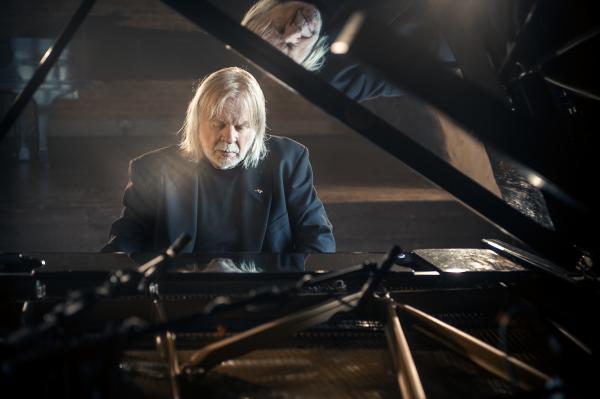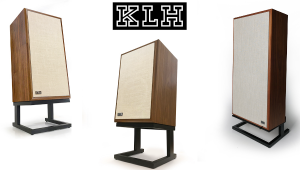Rick Wakeman: Variations on a Melody

Reinterpreting classic songs is always a potentially risky venture — but if you’re noted British keyboard maestro Rick Wakeman, you know the secret to making just about any song your own.
“If a song has a good melody, you’ll always be able to recognize it, even without lyrics,” Wakeman notes. “When you have great melodies to start with, you can play around with them in a way that contains the essence of the original recording, but still feels completely different.”
He’s not wrong, either. And there’s plenty of sonic evidence to prove the man’s melody theorem too, as witnessed by the contents of Wakeman’s two most recent solo efforts, January 2017’s Piano Portraits (UMe) and October 2018’s Piano Odyssey (Sony Classical). Both albums find Wakeman and his distinctive Steinway Model D grand piano lending new life to such wide-ranging material as Paul Simon’s “The Boxer,” George Gershwin’s “Summertime,” and a portion of Franz Liszt’s Liebesträume, not to mention his stripping down of some key material he helped make famous in the 1970s with his fellow progmeisters in Yes — namely, “Roundabout” and “And You And I.”
Much of this fine one-man-showmanship is now on display on Wakeman’s Grumpy Old Rock Star Tour, which is now well underway in the U.S. and Canada. (The dates are here — after you scroll down past the Piano Odyssey 2019 UK dates section, that is).
Of course, Wakeman still finds time to perform with his full solo band and in other group configurations. The good news is, he’ll likely do so again in 2020 with the prime prog-centric collective now officially known as Yes Featuring Jon Anderson, Trevor Rabin, Rick Wakeman. (Previous tours found the band initially operating under the more sparse ARW acronym or the fully spelled out Anderson, Rabin and Wakeman moniker.)
Wakeman, 70, called from across the Pond to discuss the current (and future) status of that cherished Yes/ARW collective, why he continues to endorse surround sound and vinyl listening, why he needed to get Brian May’s approval to cover “Bohemian Rhapsody,” and when’s the right and wrong time to wear his signature cape onstage during a performance. High vibration go on. . .
Mike Mettler: Before we talk about your solo tour and solo work, I wanted to find out about the status of the band you formed with [lead vocalist] Jon Anderson and [guitarist/vocalist] Trevor Rabin.
Rick Wakeman: ARW was a very important area of my life. I was really thrilled when we put it together. Jon and I talked about it quite a few years ago — about 10 years ago, when we did an acoustic duo album together called The Living Tree [released in October 2010], and we did a few concerts for it as well.
Mettler: Yeah, I saw the show you did in New York City, in that cool churchlike venue [i.e., Concert Hall at The Society for Ethical Culture, on the Upper West Side of NYC, on October 24, 2011].
Wakeman: I really loved doing it. And the album was a way for us to get back to melody-writing, which we felt was very important. It was really successful in Europe and they asked us to do another one, but we said, “No.” What Jon and I wanted to do at that point was put a band together to play Yes music, because we felt it should be played.
Interestingly, we both went, “Okay, first phone call — who’s the guitarist?” And then we both said, “We ought to call Trevor.” So, Jon met with Trev in California, and he was as enthusiastic as the pair of us. Then Trevor added the great drummer Lou Molino III, who does a lot of great work in California. I brought Lee Pomeroy, who’s most decidedly the best left-handed bass player currently around. He’s absolutely brilliant — and a lovely guy to boot.
We put the band together and did the first tour [from October 2016 to October 2017], which we absolutely loved. Then we did more touring [from June to September 2018], which we also loved, but we decided that it’s pretty much come to the end of the road. We set out to achieve playing Yes music the way we wanted to, and we think we achieved that. Next year, we’ll start what will probably be a farewell tour, in 2020, and we’ll be able to properly say goodbye to all the Yes fans who’ve supported us.
Mettler: I saw an early ARW show in New Jersey [on October 26, 2016 at the Count Basie Theatre in Red Bank]. Around that time, all three of you told me you were planning on recording new material. Is that off the table?
Wakeman: No, not yet. There’s one thing that’s settled, and I’ll be honest with you — we’ve gotten some very, very lucrative offers from some major record companies to get out and make an album almost straightaway. But we said, “No. Hold on. If we produce some music, then it’s got to be what we consider to be of the highest standard, something that fans of Yes would go, ‘Wow — that was worth waiting for!’” If we couldn’t achieve that, then we said we’d rather not do it.
Now, we have been putting some music together over the past 3-4 years. There’s probably about 20-30 minutes’ worth, I think, that really has the potential to be quite amazing. They’re all quite epic pieces, and we think that those are the right moves. It’s very, very difficult to put it all together and get it as we want, because we all live so far apart. Trevor’s on the left coast in California, Jon’s in San Luis Obispo [in Central California], and I’m on the East Coast of Britain.
But I think what will happen on this farewell tour is that we’ll put aside the time to listen to the music that we started putting together, come up with more ideas, and maybe find some time during those tour dates of actually putting the music to bed and seeing what we end up with. If we end up with pieces that we really think we want to do, and it’s what Yes fans have been hoping for, then it’ll come out. I think there’s a very good chance it will happen. I really do.

It’s a bit like how we worked in the previous Yes days where we would do our own bits, and then all get together. The difference is, this time, we all live so far apart. We can only do so much by sending emails and files back and forth. The truth of the matter is, you need to be in the same room at some juncture, which will then be more conducive to having one idea spark another idea in somebody else. That’s really the way Yes always worked. And that will be the way, if ARW are going to do a final album that we can be proud of. That will be the way we do it.
Mettler: I’m all for that. Considering the way the revised version of “Awaken” was a highlight of the ARW show I saw, I think that seems more like the direction you’re headed in with the new material. [“Awaken” is the 15-minute linchpin of Yes’ July 1977 album, Going for the One. It’s also a song Jon Anderson has often cited as one of his favorite Yes tracks to perform live.]
Wakeman: That’s a classic example of what can happen when you’re all together. One of the things we decided on the ARW tour is that we would take some of the classic pieces and, not that we would “rethink” them, but we’d go, “Well, what would we do now?” Trevor played a massive part in that kind of thinking.
Naturally, I’m very fond of “Awaken,” especially the big organ solo that’s in the middle of it. It’s so different from the album — and yet, it’s the same, if that sort of makes sense. It creates the same atmosphere, and yet it’s completely different.
Mettler: I totally get that. Something you said to me in one of our previous interviews applies to that idea, and I’m going to quote it. You said, “The essence of a good song is that it can be done in many ways.” And you’ve certainly proven that with “Awaken.”
Wakeman: Yes, yes, and the melody is so important to that. The trouble is — how shall I put this — I felt that some Yes music was, in the backing tracks, too rhythmically based. And once that happens, you start to lose the melody content. We used to start with a melody, and then we would build around the melody. Because, at the end of the day — and I know people like great playing — it’s the melody that people remember.
Mettler: This is true. I think on the two piano albums you’ve done recently, you showed the power of melody in some of the songs you chose to cover, from David Bowie [“Life on Mars” and “Space Oddity” on Piano Portraits; “Wild Eyed Boy From Freecloud” on Piano Odyssey] to The Beatles [“Help!” and “Eleanor Rigby” on Portraits; “While My Guitar Gently Weeps” and “Strawberry Fields Forever” on Odyssey]. You take the melodies people know, and then you give them the “Wakeman twist.”
Wakeman: The goal was to pick music that had great melodies. I was recently asked by someone, “What’s your description of a great melody?” And I said, “When you hear the melody of a song and you know instantly what it is without hearing what the lyrics are — that’s how you know you’ve got a great melody there.”
And that’s really how I picked the music for Odyssey and Portraits. What’s interesting is, you can play around with the music, with variations that you have to do, without losing what it is. My relationship with “And You And I” on piano is completely different from the version we did with Yes on [September 1972’s] Close to the Edge. But it’s still very recognizable for what it is. With a melody like that one, you can play around with it and still know what it is.
Mettler: Just like you did with what I call the “choir version” of “Roundabout” on Piano Odyssey, which is a wonderful thing to have sequenced after your take on “Strawberry Fields Forever.”
Wakeman: (chuckles) Yeah!
Mettler: Hearing how songs evolve over 5 years, or even 40 years — like how certain songs from certain earlier albums of yours are interpreted today — I like seeing what “Jane Seymour” [from January 1973’s The Six Wives of Henry VIII] is up to at this point in time, and how she’s matured in this day and age, on Piano Odyssey.
Wakeman: Yeah! It’s interesting you bring that up, because, as I’ve said, what I do is variations on my material — and that’s not anything new that I invented. Composers have been doing that for years with other people’s music. And it’s great. If you can get a good tune and play around it, it’s fantastic — and that includes your own music.
And that includes “Jane Seymour” too. What the record company said was, “Look, that was originally an organ piece. Why don’t you play around with it on piano?” And I said, “Hmm, on piano. . . how would that go?” I tried it, and they were right! There are no set rules for what we can and cannot do.
Mettler: That’s a good point. It makes me think of what you did with Queen’s “Bohemian Rhapsody” [the final track on Piano Odyssey].
Wakeman: “Bohemian Rhapsody” is a classic example as well. I mean, I’ve always loved “Bohemian Rhapsody,” and [Queen guitarist] Brian May is one of my closest friends. My engineer Toby Wood, who was tasked with working on the violins and the string section, said, “That sounds so good.” And I said, “I’m really, really pleased.” Then Toby said, “Do you think Brian May will like it? I know he’s a friend of yours.” And then I went, “Oh no!” — because I know Brian hates a lot of versions done of “Bohemian Rhapsody.” He really doesn’t like them at all. So, I figured I’d send him a finished mix, not a rough mix, and if he didn’t like it, I wouldn’t put it on the album. I’d rather keep the friendship than have the track on there.
I phoned him up and said, “I’m going to send you a track I just recorded.” He said, “Oh, what’s that?” I said, “‘Bohemian Rhapsody,’ done solo on piano.” And he said (sighs with slight resignation), “Ohhhhh.” “Can I send it to you?” “Okay.”

I sent it to him, and he came back in literally a half hour and he said, “This is fantastic! I absolutely love it! Even more important, I can tell you that Freddie [Mercury, Queen’s late, legendary lead singer] would have adored this!” I said, “Oh, that’s great. So I can include it?” He said, “Yeah, fire away, then! But there’s a bit towards the end that I think could use a little bit of guitar.” I cued it up on the computer, listened to it, and went, “That’s a really good idea. I’ll go get someone to do it.” He said, “No you won’t — I’ll do it!” He did that cameo flamenco guitar for me, which was very special.
Mettler: It’s such a nice touch — and that’s the perfect song to end that album too. I think you’ll now have to have the Piano Trilogy, but I don’t know what you’ll call the third one. Do you have another one in the pipeline?
Wakeman: There is gonna be a third one this Christmas, called Christmas Portraits. It’s just pure piano with no additives and no vocals. It’s great, well-known Christmas pieces done in variation style like I did the Portraits and Odyssey albums, and it’ll be out at the end of November. [Christmas Portraits is currently set for release by Sony Masterworks on November 29, 2019.]
Mettler: Oh wonderful, wonderful. I’m also glad that three of your solo albums came out in quad on the DVD-Audio format, which we discussed at length in 2016 [in addition to the 5.1 mixes of a number of classic Yes albums on Blu-ray, right here]. As we sit here today, what are your thoughts about the surround format in general?
Wakeman: I just think it’s great. And it’s lovely that so many young people are discovering it now, and are having great fun with it.
Mettler: It gives us that added dimension to what you do, for sure. Would you encourage more surround in the future for, well, anything from your catalog?
Wakeman: I certainly would — absolutely I know there are people who say, “Oh, it only works if you’re sitting in the right position, and who has time for that?” Well, why not? If you’re sitting down to listen to music and are enjoying it, that’s what you came to do anyway.
Mettler: You must also be happy to see that the vinyl revival is still going on as well.
Wakeman: Yes! And now vinyl is outselling CDs. What’s happening is, over here [in England], the biggest selling electronic product at the moment is turntables.
Mettler: It’s pretty big over here too. And it seems like the younger generation is getting into it for the right reasons.
Wakeman: It’s true, and what they’re saying is, “When we play the vinyl, it sounds different.” Some might still be buying the CDs for whatever reason, but they’re buying vinyl for many, many reasons — which also includes the great covers. They’re also discovering some great cover artists. What people are now understanding is that music is a package. There’s more to it than just invisible sound coming from nowhere, or out of the library, or somewhere.
Mettler: An album is not just a commodity, but a full experience. Sitting down with the cover and the artwork while the music is playing is all part of it.
Wakeman: Yes it is, and that’s so great. I have this argument that I use that, for years, record companies, when something new comes out, they move to quickly to replace the other one. CD was to replace vinyl, MiniDiscs and iPods were to replace the CD, and all that. And that’s wrong! They’re not replacing them — they’re additions to the ways you can buy your music.
I use the argument that if a new brand of coffee comes out, you don’t clear the shelf of all the other coffee — you put the new one up there. People have a choice of how they choose their coffee, and it’s the same with music. And that’s how it should be.
Mettler: Choice is key, agreed. You’d miss more than half of your classic, in-the-cathedral performance during [the song] “Close to the Edge” if you’re listening to a compressed file.
Wakeman: Yeah, and it’s quite special when that kind of thing happens — but it’s so hard to put it in words. If I have one regret, it’s that it’s hard to hear that kind of thing when you’re in a band. One thing musicians need to keep in mind, especially when it comes to great epic pieces like that one, is that you need to enjoy it in the moment, because you never really get to hear things like the hook for the first time.
There’s an interesting thing that happened to me, way back in the year 2000. I was in South America, where I go on tour a lot with my band. I got to our hotel in Buenos Aires. I came out and there was a young man there who told me he was 16. He spoke English, and he had my [aforementioned January 1973] Six Wives of Henry VIII album. As I’m signing it for him, I asked, “What do you like about this old music?” — and he got really irate! He smacked the album and said, “This might be old music to you, but it’s new to me! I only heard it for the first time last week. It’s new.”
You’ve always got to remember, there are people always listening to music, and what they’re listening to is new, to them. Next, he said, “When you’re out playing a concert, there will be people out there listening to your music for the first time. That means it’s new!” And then he walked off.
I went back into the hotel, and my drummer, Tony Fernandez, was waiting at the bar. He said, “You look shell-shocked!” And I said, “I am. I’ve just been taught a big lesson by a 16-year-old Argentinian kid.” If you’re listening to Beethoven’s Fifth for the first time, then that’s new! Ever since that particular day, I’ve brought that idea with me onstage. As I’m walking out, I think, “Just remember — there are people out there who are hearing this for the very first time.”
Mettler: The journey they take is literally the first time, for some people.
Wakeman: Yeah, absolutely! A number of people who came to the shows I did last week also said so, so it’s absolutely true.
Mettler: Well, I know we’re coming to the end of our time here, so I’m just curious — with all these superhero movies that are so popular right now, do you get any points for people wearing capes in them, since that seems to be a big thing?
Wakeman: (chuckles) It’s really funny! When I do the rock shows, the contracts with the promoters have it written in that I wear at least one of the classic capes when I come out. But it’s not possible, believe it or not, for the solo shows. You cannot really sit at the piano and play with a cape on, because they hang over your arms — and they weigh a ton. It’s fine when you’re standing up, but not when you’re sitting down. I tried it, but, sadly, it’s just not possible. I could come on with it for the encore and really make an effort, but it would be a really short encore.
But the cape is still a really major part of my life, so I may still come out with it on when we’re doing the rock shows.
- Log in or register to post comments






























































